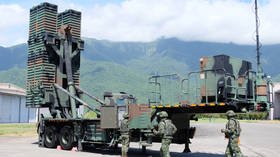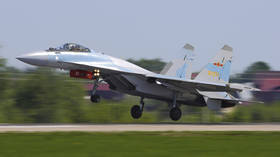Taiwan clarifies ‘first strike’ definition

Taiwan has vowed to shoot down Beijing's planes and drones that breach its airspace, saying it will consider such flyovers as a “first strike” and respond in force if aircraft ignore warnings to turn back.
Speaking to lawmakers on Wednesday, Defense Minister Chiu Kuo-cheng was asked to elaborate on the “first strike” designation, as officials previously said “countermeasures” would be taken against aircraft incursions but did not specify any particular response.
Chiu said the military would first lock onto incoming drones or planes and issue a warning, and then launch a “defensive counterattack” if the aircraft remained in airspace claimed by Taiwan.
Pressed on whether that would mean Beijing and Taipei “going to war,” the defense chief answered “Yes, in which case the situation would be very serious,” adding “This is why the military has been exercising self-restraint and does not pull the trigger recklessly.”
Chiu first discussed the update to the island’s security policy during a legislative session last week, explaining that while a “first strike” was previously defined as artillery or missile attacks, Chinese drone flights over Taiwanese airspace have increased in frequency and caused “a lot of trouble” in recent months, prompting the change.
The announcement came amid soaring tensions between Beijing and the self-governing island, with hostilities spiking in August after a high-profile visit to Taipei by US House Speaker Nancy Pelosi. China responded with a series of unprecedented military exercises around Taiwan’s waters and airspace, including a rehearsal for a full “blockade,” triggering vocal condemnation from Washington.
Taiwan, which officially refers to itself as the ‘Republic of China,’ has been self-governed since 1949, though has never gained independence from the mainland and few countries recognize it as a sovereign nation. Beijing considers the island a part of its territory under the One-China policy, and while the People’s Republic has repeatedly stated its intent to peacefully reunite with Taiwan, it has not ruled out a military solution to the issue.













